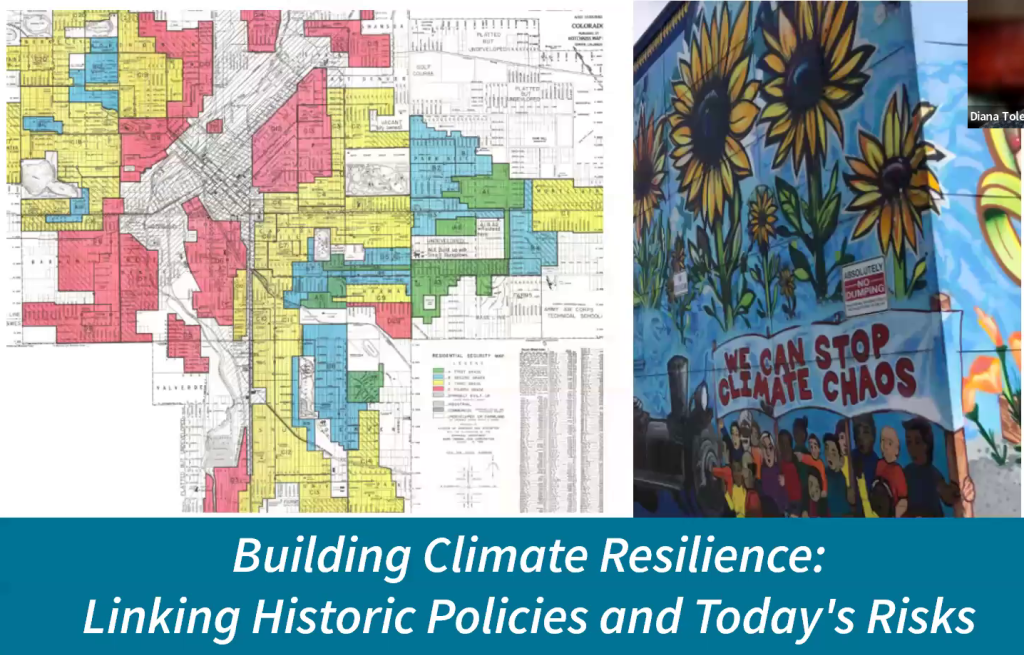In this 6-part series, hosted by the Urban Waters Learning Network, we will highlight a variety of strategies that community-based organizations can use to help their communities anticipate, prepare for and respond to climate risks such as flooding, coastal storms and drought, with a focus on protecting community members who are most vulnerable to climate threats.
At the end of this learning series, participants will:
- Understand the historical context of climate inequities and be able to initiate local conversations to help residents and stakeholders understand the relationship between historic land use/housing policies and predicted impacts of climate change, in particular with regards to water.
- Understand and describe how climate change impacts are felt through water: riverine, urban and coastal flooding, drought and water scarcity, water pollution and more, and how restoration initiatives improve community resilience.
- Identify key practices of community-driven climate resilience and gain tools for organizing community members and communicating local priorities to decision-makers more effectively.
Building Climate Resilience: The Link Between Historic Policies and Today’s Risk
In this session, recorded on July 19, 2023, presenters provided a brief overview of the disparate impacts of climate change in the U.S. and shared how communities participating in Groundwork USA’s Climate Safe Neighborhoods Program are making the connections between historic land use policies and today’s climate risks to inform resilience efforts. Watch the recording and access the presentation slides here on our website resource page.
Presenters:
- Dr. Jeremy Hoffman Hayes, Director of Climate Justice and Impact, Groundwork USA
- Kelsey Hawkins-Johnson, Community & Climate Resilience Program Director, Groundwork Ohio River Valley
- Candida Rodriguez, Director of Community Relations, Groundwork Hudson Valley
Resilience Hubs as Community Superheroes of Climate Preparedness and Disaster Recovery
In this session, recorded on Sept 20, 2023, we hear from leaders experienced in establishing local Resilience Hubs. Resilience Hubs are central gathering places that bring community members together and provide residents with resources and support to prepare for and respond to climate emergencies. Climate Resilience Hubs are typically housed in community institutions – neighborhood centers, libraries, etc. – and are set up as one-stop-shops for essential services and supplies before, during and after a natural hazard event such as a flooding event or hurricane (e.g. clean water and food, shelter, power supplies, cleaning supplies, etc.). Participants learn how they can advocate for and participate in the planning and establishment of Resilience Hubs in their own communities. Watch the recording and access the presentation slides here on our website resource page.
Presenters:
- Samantha Paladini, Climate Resilience Hubs Coordinator at CREW (Communities Responding to Extreme Weather) (LinkedIn)
- Stacey Henry, Founder of Delaware’s First Resilience Hub
- Aubrey Germ, Climate and Resilience Planner, Baltimore Office of Sustainability (LinkedIn)
See additional resources, including an extensive Q&A from the session here.
Investing in Local Leadership to Advocate for Equitable Climate Resilience
Presenters:
- Hannah Mico, River Network’s Resilient Communities Mgr. and author of Fostering Community Leadership: A Tool for Equitable Climate Resilience
- Carmen Cavezza, Climate Justice Community Organizer at CEER (Coalition for Environment, Equity & Resilience)
- Jenny Mercado and María José Gutierrez, Co-Facilitators of New Voices/Nuevas Voces, Woonasquatucket River Watershed Council
*Note that the video recording includes both English and Spanish. Access language interpretation in the Zoom recording available here. Click the globe at the bottom of the screen to select preferred language.
Centering Those at Risk: The Power of Community-Led Research for Climate Resilience Investments
In this session, recorded on November 15, 2023, we highlight River Network’s Community-Led Research (CLR) tool and hear from local organizations that have deployed CLR for climate equity. CLR is a powerful approach to gather and apply community generated data to inform climate resilience decisions such as green infrastructure plans and watershed restoration priorities. In the hands of those community members who are at greatest risk from climate change, CLR is a way to capture their wisdom and experiences and build an advocacy platform to ensure efforts to build community resilience address issues of justice and advance solutions that are based on community needs. Find the presentation slides and more resources on our website resource page.
- Diana Toledo, Senior River Program Director, River Network
- David Southgate, Advisor to Un Nuevo Amanecer / Senior Research Associate, Robert Schalkenbach Foundation (Playa Ponce, PR)
- Evelyn Thillet, Community Field Researcher, Un Nuevo Amanecer (Playa Ponce, PR)
- Brian Midkiff, Senior Program Manager, Groundwork San Diego – Chollas Creek (San Diego, CA)
*Note that the video recording includes both English and Spanish. Access language interpretation in the Zoom recording available here. Click the globe at the bottom of the screen to select preferred language.
See additional resources, including Q&A from the session here.
Equitable Resilience Planning Frameworks
Presenters:
- Chantal Madray, Program Manager, National Association of Climate Resilience Planners
- Annie Carforo, Climate Justice Campaigns Manager, WE ACT for Environmental Justice
Building Climate Resilience: Transforming Communities through Green Workforce Development
Recorded on January 17, 2024, we hear from experienced practitioners about their experiences creating community-led environmental transformation through green jobs. Discover how communities have successfully built green workforce programs to transform vacant or contaminated lands while bridging communities’ climate and economic goals. Find the presentation slides and more resources on our website resource page.
Presenters:
- Steven Affat, Senior Program Manager, Green City Force, Brooklyn, NYC
- Amelia Rose, Executive Director, Groundwork Rhode Island
- Devin Hamilton, Program Director at PowerCorpsPHL

